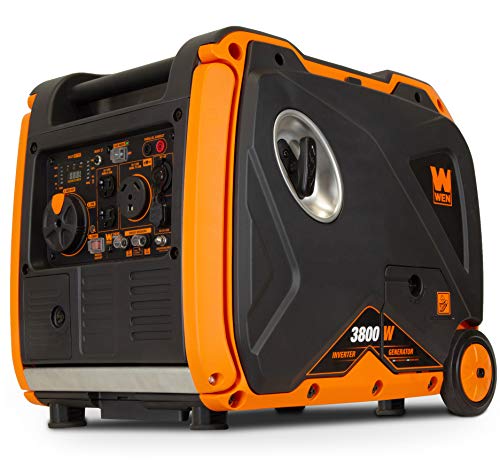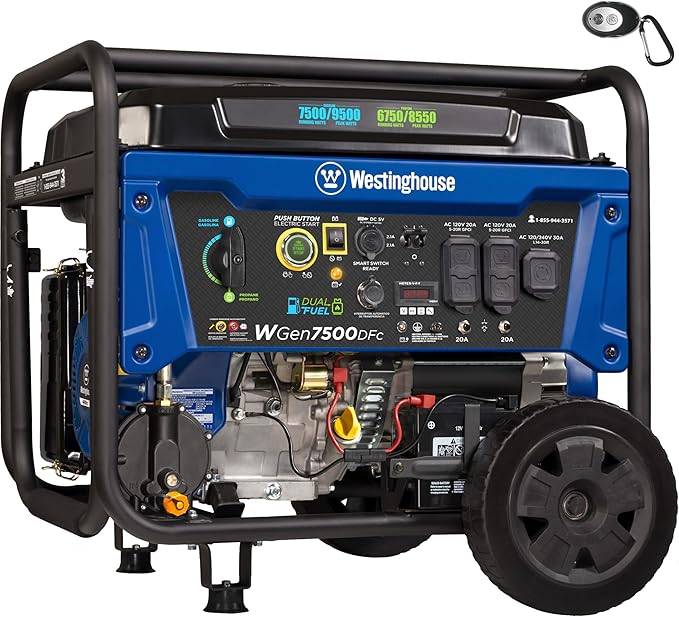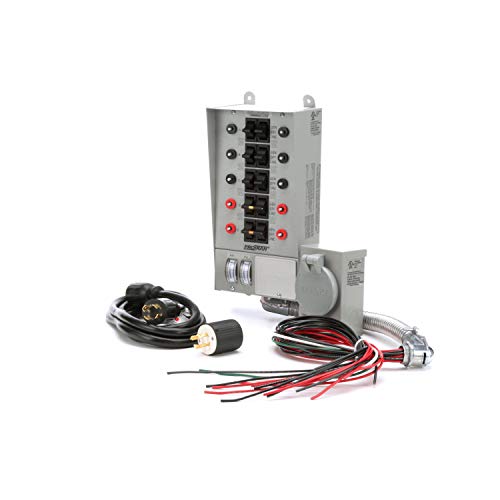10 The Best Generators At Home Depot Buyer's Guide for 2026 | SHR
Mike Kim Feb 13, 2026 3:57 AM
Welcome to our guide on the best generators available at Home Depot. As one of the leading home improvement retailers, Home Depot offers a wide selection of generators to meet various power needs. Whether you're preparing for storms, camping trips, or DIY projects, Home Depot has you covered with top-quality generators from trusted brands. In this article, we'll explore some of the best generators Home Depot has to offer, highlighting their features, benefits, and considerations to help you make the right choice for your power needs. With Home Depot's range of generators, you can ensure you have reliable backup power whenever and wherever you need it.
What to Consider to Buy The Best Generators at Home Depot
When shopping for a generator, it helps to know what makes each model stand out. Below are key factors and insights to help you choose the right one from Home Depot’s lineup:
-
Power Output Options:
Choose a generator based on your wattage needs. Small portable models (2,000–4,000 watts) are ideal for camping or tailgating, while heavy-duty units (10,000–13,000 watts) can power an entire home during outages. -
Fuel Type Flexibility:
Many modern generators now offer dual-fuel capability, letting you switch between gasoline and propane. This feature increases convenience and ensures backup fuel availability during emergencies. -
Noise Level Considerations:
Look for models with low decibel ratings (under 70 dB) if you plan to use them in residential areas. Inverter generators typically run quieter and are great for home or RV use. -
Ease of Start:
Electric start or remote start features make operation simpler, especially in cold weather. Manual pull-start systems are still reliable but require more effort. -
Portability and Design:
Generators with foldable handles, never-flat wheels, and compact frames are easier to move around. This matters if you’ll use the unit across multiple locations. -
Safety Features:
Built-in CO sensors and automatic shut-off systems help protect against carbon monoxide hazards and engine damage due to low oil. -
Run Time and Efficiency:
Check the fuel tank size and run time per tank. Models that offer 8–12 hours of continuous power on a single fill are ideal for long outages. -
Maintenance and Durability:
Generators with a cast-iron sleeve or full metal frame last longer under heavy use. Some brands also include an hour meter to track maintenance intervals. -
Warranty and Support:
Always review the manufacturer’s warranty coverage and Home Depot’s return policy. Reliable after-sales service ensures peace of mind for long-term ownership.
- 9.4
- BrandWestinghouse
- 9.3
- BrandDuroMax
- 9.2
- BrandGENMAX
- 9.0
- BrandWestinghouse
- 8.6
- BrandWEN
- Prime
- 8.4
- BrandWEN
Last update on 2026-02-13 / Affiliate links / Images, Product Titles, and Product Highlights from Amazon Product Advertising API
Source: Amazon
Best Dual-Fuel Power: Westinghouse 9500 Peak Watt Dual Fuel Home Backup Portable Generator
Pros:
-
High Wattage Output
-
Electric & Remote Start
-
CO Sensor Safety
-
Durable Engine Build
Cons:
-
Heavy for Portability
The Westinghouse 7500DF generator delivers impressive performance with 7500 running watts and up to 9500 peak watts on gasoline, or 6750 and 8550 watts on propane. Its dual-fuel capability offers flexibility during emergencies or outdoor use, allowing users to switch between gasoline and propane for convenience and cost efficiency. The 420cc 4-stroke OHV engine is built with a cast-iron sleeve for longevity, while the automatic low-oil and CO shutdown features enhance safety during operation. The control panel is well laid out, including two GFCI-protected outlets and a 30A twist-lock option, all covered for added protection. The electric push-button and remote start simplify use, and the digital hour meter helps with timely maintenance.
From a customer’s perspective, this model stands out for its reliability and ease of use right out of the box. Users appreciate the strong output for powering large home appliances during outages, as well as the quiet and smooth performance. However, due to its size and weight, it may be less convenient to move frequently without additional transport accessories. Overall, it’s a dependable and feature-rich option for residential backup or outdoor power needs.
Best Whole-Home Power: DuroMax XP13000HX 13,000-Watt Dual Fuel Portable Generator
Pros:
-
Massive Wattage Output
-
Dual-Fuel Flexibility
-
CO Alert Safety System
-
Transfer Switch Ready
Cons:
-
Very Heavy Unit
The DuroMax XP13000HX is a powerhouse generator built for both residential and commercial use. Delivering 13,000 starting watts and 10,500 running watts, it can easily support an entire household during outages or heavy-duty job sites. The 500cc OHV DuroMax engine with all-copper windings ensures long-term durability and consistent power delivery. Its dual-fuel system allows seamless switching between gasoline and propane through a simple front-panel control, offering flexibility based on fuel availability and cost. The electric push-button start adds convenience, and the generator’s CO Alert system provides an essential layer of protection by automatically shutting down when harmful fumes are detected.
From a user standpoint, the XP13000HX earns high marks for its raw power, rugged build, and comprehensive outlet panel that supports a wide range of devices, including transfer switch-ready setups. Many owners appreciate its ability to run large appliances like air conditioners and refrigerators simultaneously without strain. However, weighing 245 pounds, it’s not the easiest model to move despite its wheel kit. Overall, it’s a high-capacity, reliable option ideal for homeowners who need dependable, full-home backup power.
Best Quiet Performance: Honda EU2200ITAN 2200-Watt 120-Volt Super Quiet Portable Inverter Generator
Pros:
-
Ultra-Low Noise Level
-
Lightweight and Portable
-
Reliable Honda Engine
-
CO-Minder Safety Feature
Cons:
-
Limited Power Capacity
The Honda EU2200i is a compact yet highly dependable inverter generator designed for quiet, efficient operation. Delivering 2200 watts of clean power, it’s ideal for sensitive electronics, camping, tailgating, or backup for small household appliances. Powered by a 121cc 4-stroke Honda engine, it combines strong performance with fuel efficiency, running smoothly for extended periods on its 1-gallon tank. The CO-Minder system enhances user safety by automatically shutting off the generator when carbon monoxide levels become unsafe. Its two 120V outlets provide stable output, while the lightweight 51-pound design makes transport and setup effortless.
From a customer perspective, the EU2200i stands out for its whisper-quiet operation and outstanding reliability—qualities that have long defined Honda’s small-engine lineup. Users appreciate how easy it is to start and maintain, as well as its consistent power delivery for recreational or light home use. The only limitation is its modest wattage, which may not suit high-demand appliances, but for portability and performance, it remains one of the most trusted compact generators on the market.
Best High-Power Dual Fuel: Westinghouse 12500 Peak Watt Dual Fuel Home Backup Portable Generator
Pros:
-
Massive Output Capacity
-
Dual-Fuel Flexibility
-
Remote & Electric Start
-
CO Sensor Safety
Cons:
-
Heavy for Manual Transport
The Westinghouse 12500DF generator is engineered for serious residential backup power with 9500 running watts and 12,500 peak watts on gasoline, or 8500 running and 11,200 peak watts on propane. It features a robust 457cc 4-stroke OHV engine with a cast-iron sleeve for durability and dependable operation. The dual-fuel capability offers flexibility to switch between gasoline and propane, ensuring readiness during emergencies or extended outages. With up to 12 hours of runtime on a 6.6-gallon tank, it delivers steady performance for long durations. The digital hour meter, automatic voltage regulation, and CO sensor add layers of protection and convenience.
Customers value its plug-and-play design, with easy setup and thoughtful inclusions like the remote start key fob, battery charger, and propane hose. The multiple outlet options, including a 50A RV-ready and transfer switch-ready ports, make it adaptable for various household or recreational uses. While its 225-pound weight can limit portability, most users find the trade-off worthwhile for the reliable, high-wattage performance and dual-fuel efficiency it provides. Overall, it’s a strong contender for anyone needing consistent, heavy-duty home backup power.
Best Heavy-Duty Dual Fuel: DuroMax XP13000EH 13,000-Watt Dual Fuel Portable Generator
Pros:
-
Powerful 13,000-Watt Output
-
Dual-Fuel Flexibility
-
Durable All-Metal Frame
-
Transfer Switch Ready
Cons:
-
Bulky and Heavy Design
The DuroMax XP13000EH delivers impressive power and reliability, making it a strong choice for whole-home backup during outages. Offering 13,000 starting watts and 10,500 running watts, it can handle large appliances and essential systems simultaneously. The Dual Fuel feature lets users operate on either gasoline or propane, ensuring flexibility and convenience during emergencies or extended power loss. Powered by a robust DuroMax engine and built with an all-metal frame, this generator is designed for long-term durability and heavy-duty use. Its electric push-button start and easy fuel-type switch enhance user convenience, while multiple outlets, including a 50A transfer switch-ready option, provide broad compatibility for residential needs.
From a customer’s perspective, the XP13000EH stands out for its rugged construction, reliability, and strong performance under load. Homeowners appreciate how it maintains stable output even with multiple appliances running, as well as the ease of setup and operation. While its 234-pound weight makes it challenging to move despite the wheel kit, most users agree that its power capacity and dual-fuel efficiency far outweigh the inconvenience. It’s a dependable, high-capacity generator built to withstand demanding conditions and long-term use.
Determining the size of generator needed to power a house depends on several factors, including the size of the house, the number of appliances and systems requiring power, and individual power usage habits. Here's a general guideline to help determine the appropriate size of a generator for home use:
Calculate Total Power Requirements: Start by listing all essential appliances and systems you want to power during an outage. This typically includes lights, HVAC systems, refrigerators, water pumps, communication devices, and other critical appliances. Determine the wattage requirements of each appliance and add them up to get the total power consumption.
Consider Starting Wattage: Some appliances, such as refrigerators and air conditioners, require extra power to start up compared to running continuously. Make sure to account for the starting wattage of these appliances when calculating total power requirements.
Factor in Surge Capacity: Generators typically have a surge capacity, allowing them to handle temporary spikes in power demand when multiple appliances start simultaneously. Ensure the generator's surge capacity is sufficient to start all appliances without overloading the system.
Consult a Sizing Guide or Professional: Many generator manufacturers provide sizing guides or online calculators to help determine the appropriate generator size based on your power requirements. Alternatively, consult with a qualified electrician or generator specialist to assess your specific needs and recommend the most suitable generator size for your home.
Consider Future Expansion: If you anticipate adding more appliances or expanding your home in the future, it's wise to choose a generator with some extra capacity to accommodate these changes.
Choose the Right Size: Once you have calculated your total power requirements and considered surge capacity and future expansion, select a generator with a rated capacity that meets or exceeds your calculated power needs.
In summary, the size of a generator needed to power a house depends on factors such as total power requirements, surge capacity, and future expansion plans. By carefully assessing your needs and consulting sizing guides or professionals, you can choose the right-sized generator to ensure uninterrupted power supply for your home during outages.
Is a 22Kw generator big enough for a house?
A 22kW generator can typically provide enough power to meet the needs of a medium to large-sized house during a power outage. However, whether it's sufficient for your specific home depends on factors such as the size of your house, the number of appliances and systems you need to power, and your lifestyle preferences.
Here are some considerations to help determine if a 22kW generator is big enough for your house:
House Size: A 22kW generator is generally suitable for medium to large-sized homes. If your house is smaller or has a lower power demand, a smaller generator might suffice. Conversely, if you have a larger house with higher power needs, you might need a larger generator.
Power Requirements: Assess the power requirements of essential appliances and systems you want to power during an outage. This includes lights, HVAC systems, refrigerators, water pumps, and communication devices. Ensure that the generator's capacity is sufficient to meet the combined wattage of these appliances, including any starting surge requirements.
Generator Capacity: A 22kW generator can provide up to 22,000 watts (or 22 kW) of continuous power. Compare this to your calculated total power consumption to determine if the generator has sufficient capacity to meet your needs.
Surge Capacity: Consider the surge capacity of the generator. While a 22kW generator can provide 22 kW of continuous power, it may have a higher surge capacity to handle temporary spikes in power demand when appliances start up simultaneously.
Prioritize Essential Loads: During an outage, prioritize powering essential loads that are critical for safety and comfort. You may need to manage power usage and avoid running non-essential appliances simultaneously to stay within the generator's capacity.
Consult a Professional: For precise sizing and installation, consult with a qualified electrician or generator specialist. They can assess your specific requirements and recommend the most suitable generator size for your home.
In summary, a 22kW generator can be sufficient for many houses, but it's essential to consider your home's size, power requirements, surge capacity, and lifestyle factors when determining if it's big enough for your needs. Consulting with a professional can help ensure you choose the right generator size for your home.
What size generator do I need to run my house with AC?
To determine the size of generator needed to run your house with air conditioning (AC), you'll need to consider the power requirements of your AC unit(s) along with other essential appliances and systems in your home. Here's a general guideline to help you calculate the appropriate generator size:
Calculate Total Power Requirements: Start by listing all essential appliances and systems you want to power during an outage. This includes lights, refrigerators, water pumps, communication devices, and any other critical appliances. Additionally, include the power requirements of your AC unit(s). You can usually find this information on the unit's nameplate or in the user manual.
Determine AC Power Consumption: The power consumption of an AC unit is typically measured in British Thermal Units per hour (BTU/hr) or watts. If your AC unit provides the power consumption in BTU/hr, you can convert it to watts by using the following formula: 1 watt = 3.412 BTU/hr. For example, if your AC unit consumes 12,000 BTU/hr, it would require approximately 3,514 watts (12,000 / 3.412) to operate.
Account for Starting Surge: AC units often require extra power to start up compared to running continuously (starting surge). Consult the unit's specifications to determine the starting wattage, which can be significantly higher than the running wattage.
Total Power Consumption: Add up the power requirements of all essential appliances and systems, including the AC unit(s), to determine the total power consumption during an outage.
Generator Capacity: Choose a generator with a capacity that exceeds the total power consumption calculated in step 4. This ensures that the generator can handle the combined load, including any starting surges from the AC unit(s) and other appliances.
Consider Surge Capacity: Generators typically have a surge capacity, allowing them to handle temporary spikes in power demand when appliances start up simultaneously. Ensure the generator's surge capacity is sufficient to start all appliances, including the AC unit(s), without overloading the system.
Consult a Professional: For precise sizing and installation, consider consulting with a qualified electrician or generator specialist. They can assess your specific requirements and recommend the most suitable generator size for your home, taking into account factors such as AC power requirements, other appliance loads, and surge capacity.
In summary, determining the size of generator needed to run your house with AC involves calculating the power requirements of your AC unit(s) along with other essential appliances and systems. By carefully assessing your needs and considering factors such as starting surge and surge capacity, you can choose the right-sized generator to ensure uninterrupted power supply for your home during outages.
Read More:
10 Best Home Generator Transfer Switch Reviews & Buyer's Guide | SHR
The Top 10 Best Generators For Home Use in 2026: Reviews
Choosing the best generators at Home Depot depends on your specific power needs, budget, and preferred features. Whether you’re looking for a heavy-duty model to keep your whole home running during an outage or a compact portable unit for outdoor use, Home Depot offers a broad selection from reputable brands. Take time to evaluate factors such as wattage capacity, fuel type, run time, and noise level to find the right match for your situation.
By comparing performance, reliability, and value, you can confidently invest in a generator that delivers dependable power when you need it most. With the right choice, you’ll gain both peace of mind and lasting performance for years to come.




























